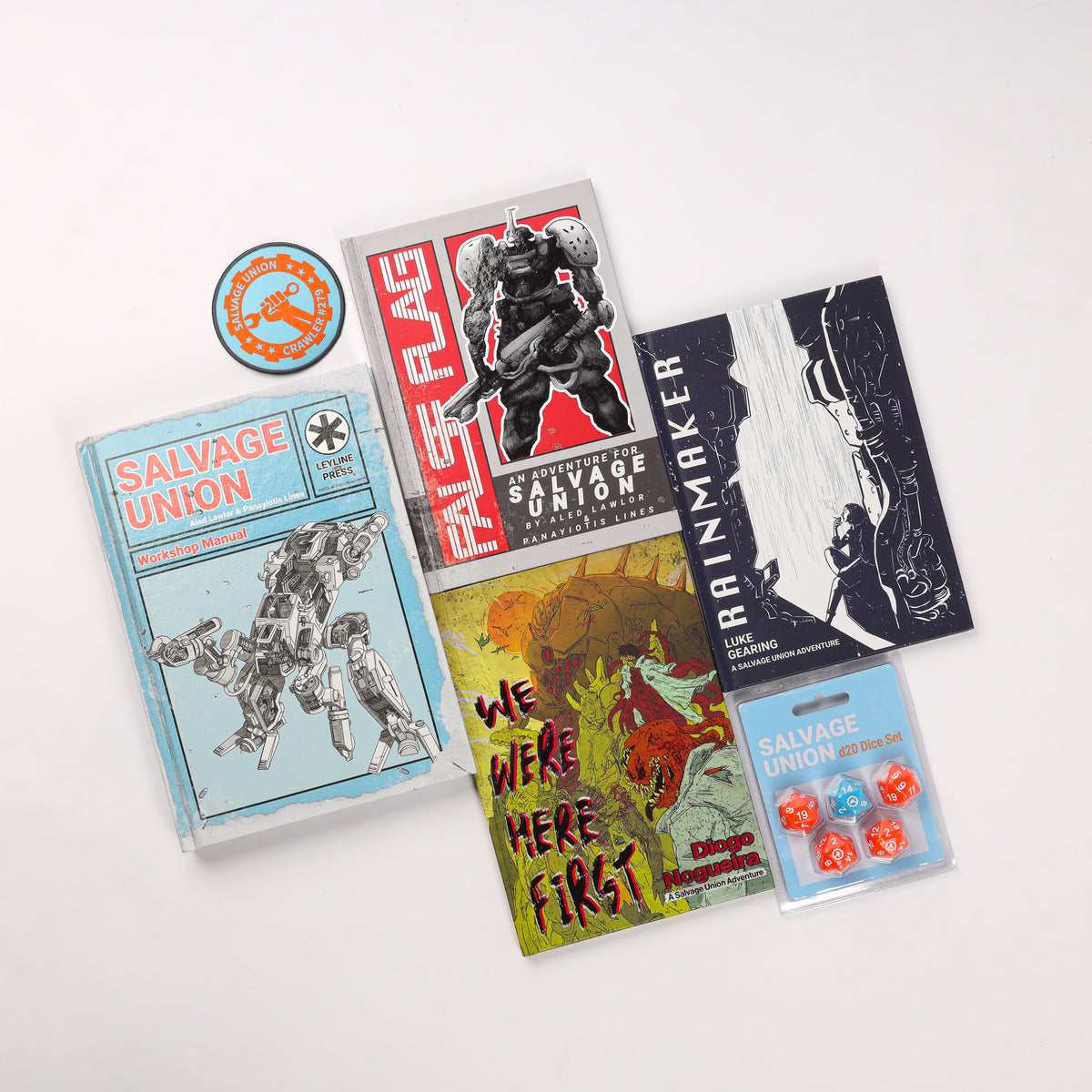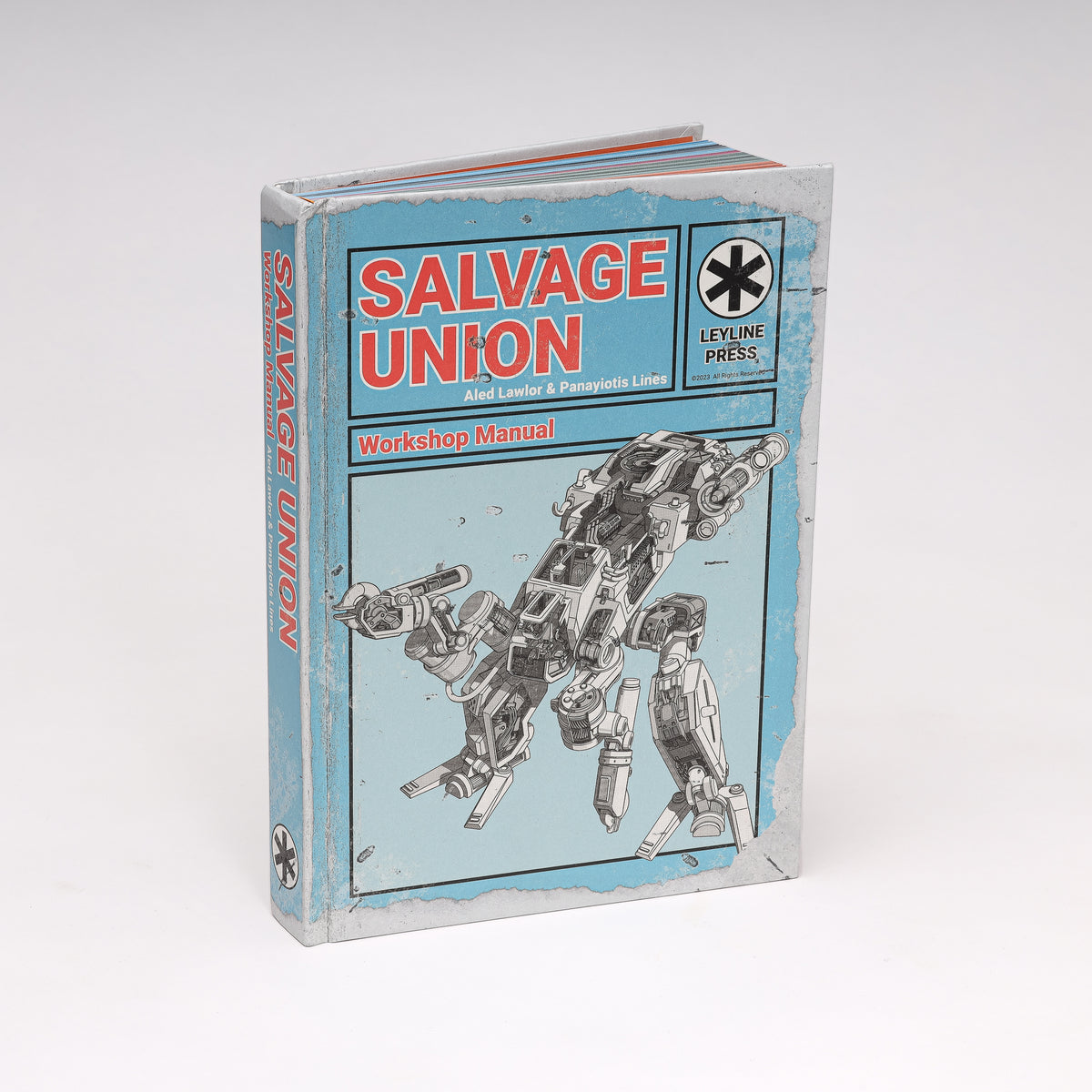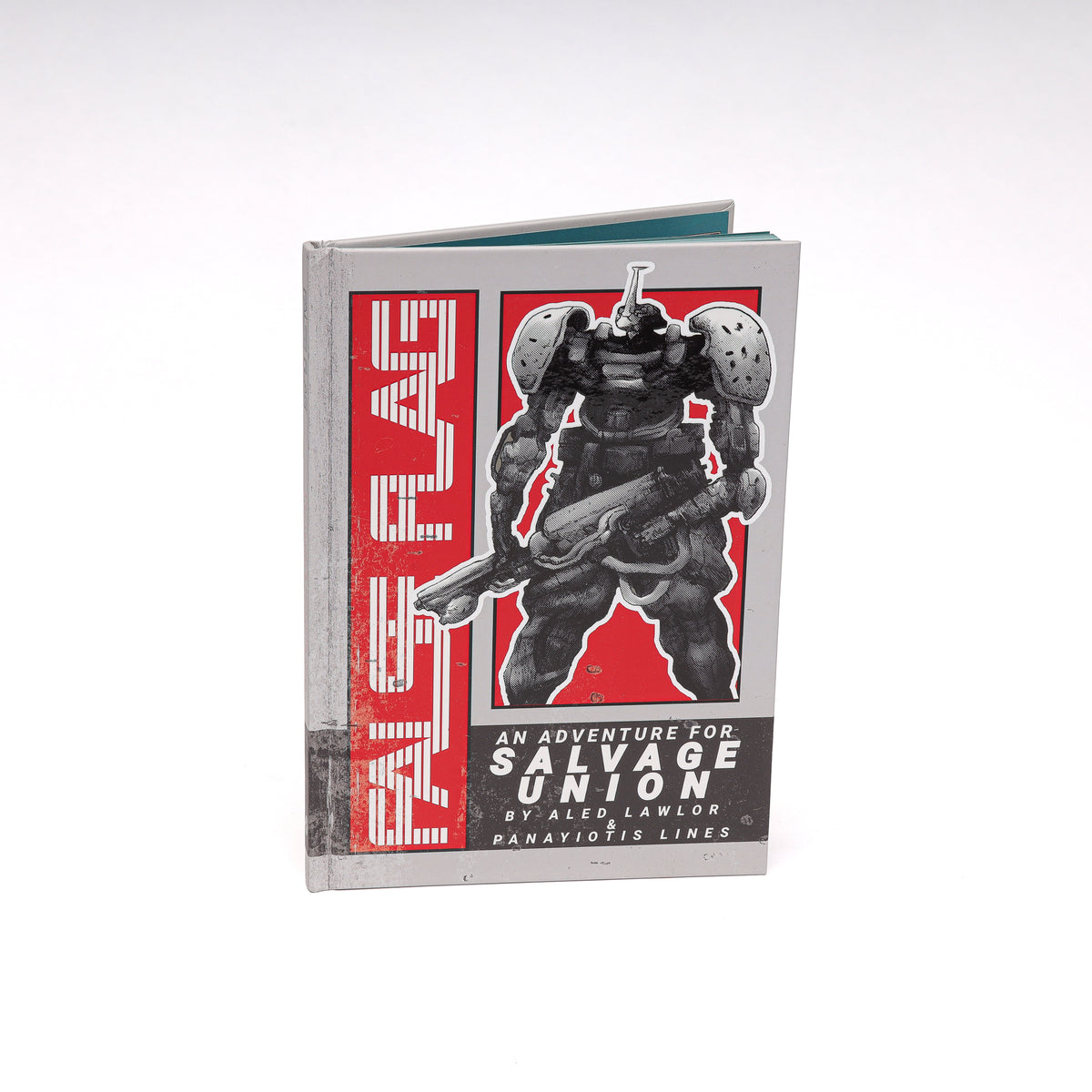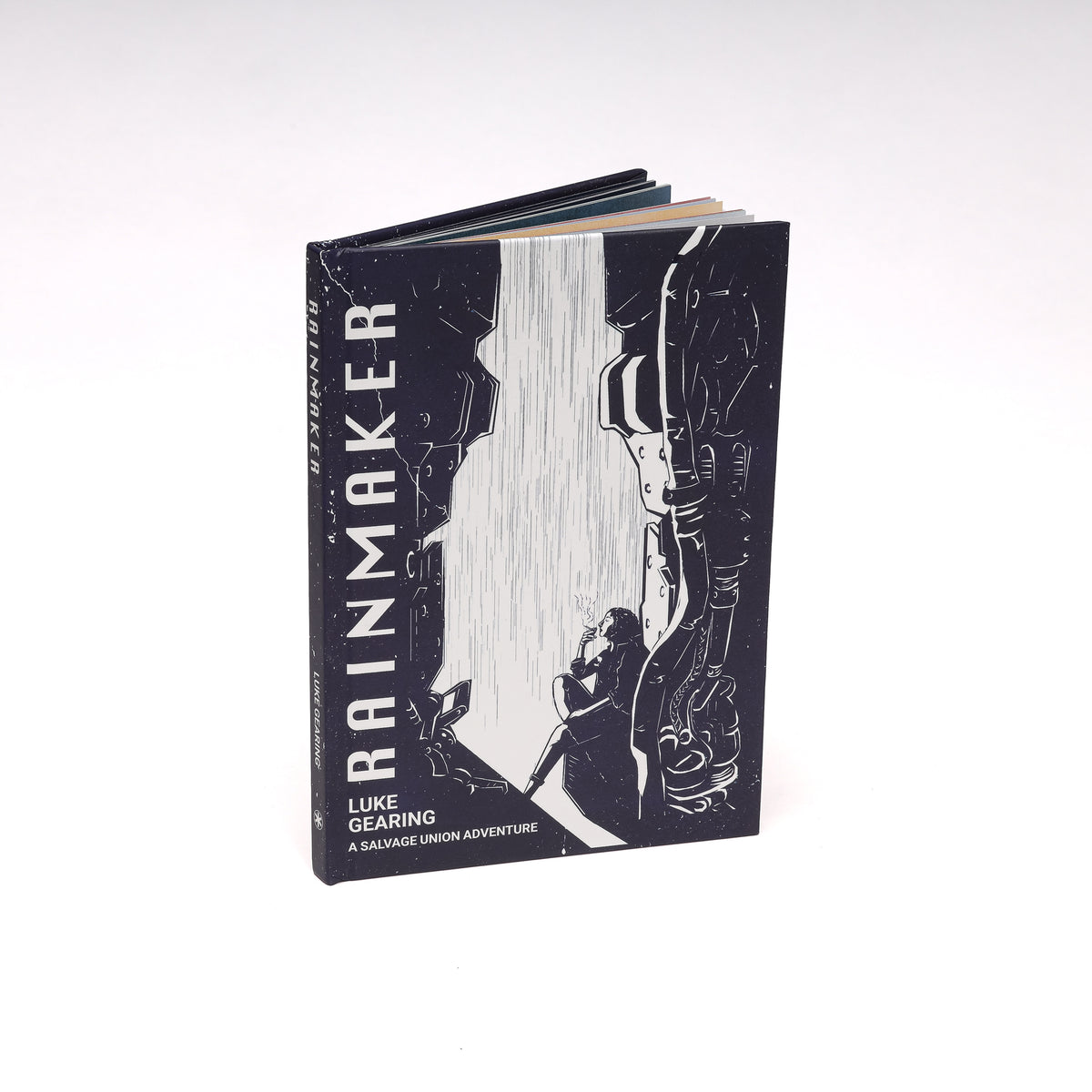Depression
I’ve been depressed since around December last year. January was the worst month. I’m starting to feel human again as spring creeps in. There are good days and bad days. I’m ok. I’ve been in therapy for several years and it’s helped, I know how to work through things.
In December of 2023 we launched Salvage Union, a post-apocalyptic Mech TTRPG that I wrote and designed alongside Aled Lawlor. It was a huge accomplishment for me that I’m incredibly proud of, and that has consumed the last couple of years of my life. I always wanted to publish a game I’d written, and realising that dream was genuinely fulfilling. It turns out depression doesn't care much for your accomplishments.
It’s quite a common experience to feel depressed after accomplishing a large life goal, you’re left with an empty feeling of ‘what now?’ I used to tell myself when I was deep in the hole that the reason I was depressed was because I was useless, a failure, I wouldn’t accomplish anything. Logically it would follow that after accomplishing something the negative voice in my head would say ‘great job old chap, I was mistaken all along’. Unfortunately, it doesn’t care. Instead it’s telling me that the game is bad, you just got lucky, the next project will suck, designing a video game would have been a way better accomplishment, everyone hates it, everyone hates you, you’re dying alone anyway, and so on.
Why does it do this to me?
Fuck you that’s why.
Dark Souls
Which is an apt segue way into the design of Dark Souls. During this depressive period I started playing Dark Souls 3, something possessed me to pick it up and dive into the broken world of Lordran once more. Souls games have always been there for me in some of the lowest times of my life. The first one I picked up was the original Demon’s Souls on the PS3, partly as it sounded like nothing else out there, and partly as it was a PS3 exclusive and one has to justify one's gamer tribe. My ‘I quit’ moment was dying over and over again in Stonefang tunnel until I came up against Armour Spider. It glued me to the ground, shot fire at me, and when I finally managed to attack it, I did a pitiful amount of damage and died skewered by its talons.
Sod that I thought and continued on with my life.
A few years later in 2015 I found myself doing night work which played havoc with my hormones and put me in an almost constant state of malaise. I remember coming home from work one day in my heavy winter clothing, the sun coming out and me realising that it must be Spring.
I found myself drawn to Demon's Souls during this period of endless nights, and this time I completed it. I learned that my initial strategy of wearing as much armour as I could, hiding behind a shield and spearing things to death was a terrible way to play the game. Instead I maxed out my endurance and strength, ran around with a huge sword, learned to dodge, roll, backstep and parry. I died. Lots. It was still an obsessive grind, beating the game section by section. But something clicked during all of those deaths. If I kept at it and persevered I’d grow stronger and eventually, even if it took hundreds of attempts, I’d succeed.
It helped, and is one of my clearer memories of that time. I quit the job after a year.
Jump to 2019 and my grandad dies, he was always one of the most encouraging voices for me growing up especially in regard to my hobbies. He set up a wargaming table in his kitchen for me and my mates to play 40k. He took me to history museums, medieval fairs, taught me to cook, and took me cycling all over the country. He encouraged me to work for myself, helping me set up a small eBay business when I was a teenager. Some of my most fond memories growing up are with him. It’s hard to write about, I still miss him everyday. Needless to say I was in a dark place.
I’d played Dark Souls briefly when it came out as well, but once more bounced off it at the time after one too many deaths.
It called out to me once more and once more I completed it. I was still playing on the PS3, getting to experience Blighttown at 20 FPS as Miyazaki intended. I had learned from playing Demon's Souls some of what not to do, but Dark Souls still proved challenging. I remember viscerally grunting at the TV during the fight with Quelaag. My roommate had to tell the person she was on the phone with that it was just me, having a normal one whilst gaming.
Yet I persisted with it. Dark Souls thematically is a game about death and rebirth, a Sisyphean struggle to light a fire to keep life alive simply for the sake of life itself, or allowing it to extinguish and fade to void, a void that will be inevitable whether you light the fire or not. It’s an analogy for life. We all have a void awaiting us. We all choose to struggle anyway, for the sake of doing, or for some purpose we define. Even if that purpose is beating a video game.
Que to now. I’d played some of Dark Souls 3 but lost my save data due and couldn't be bothered to try again. Once more it called out to me and once more I played obsessively until I beat it. Dark Souls 3 proved a slicker experience than previous titles, the systems were more streamlined, there was less backtracking. I glided through the early sections, the Abyss Watchers proved the first tough challenge. It soon dawned on me that the real difference between DS3 and the previous games, is that the bosses wanted to use my balls as a necklace.
None the less I persevered, Pontiff proved a monster, as did Dancer. But they fell one by one and soon I'd defeated The Lord of Cinder and extinguished the flame. I even beat Gael and Nameless King in the DLC content. I felt genuinely better after having done so. Not perfect, but the heaviness lifted, I found myself more able to do day to day tasks.
The inherent design of the Dark Souls has helped me multiple times deal with depression, loss and grief. I’m not alone in this, there’s a myriad other blogs and videos on others experiencing similar emotions.
There’s some science behind the phenomena, that doing something that provides a feeling of accomplishment can help cut through the melancholy. I’ve been feeling aimless, whilst daily admin has happened I haven’t been sinking my teeth into a major project, and have been feeling rather inadequate in terms of my creative output. Which when you value yourself by it isn't great for your self-esteem.
I don't know entirely why honestly, I just know it helps. Unable to just let something be without turning it into a project I inevitably tried to start designing a soulslike tabletop RPG. This was not my first attempt. It happens after every playthrough. Maybe if I can make the perfect soulslike the negative self thoughts will go away. Right?
Tabletop RPG Design
In my latest foray in designing a souls-like TTRPG I found myself looking at Runequest, Mythras then OpenQuest, Old School D&D, Year Zero. As well as the many excellent games out there that try to recreate that souls experience on the tabletop, such as Hollows, Dice Souls and Bonfire & Blade. It does seem the games have found a way to resonate with tabletop RPG designers, myself included. I found myself pouring into endless Dark Souls critical analysis videos, trying to work out what made it tick.
It’s harder than it sounds. Dark Souls the tabletop game is a ‘cursed design problem'. In the sense that trying to recreate it creates contradictions in the design that are difficult to parse.
I’m a fan of emulative design, making a game feel the way you want is often the most important aspect of the design. To get that right we have to consider what makes the souls games feel like souls games?
- Metroid-vania like exploration of a fallen world.
- Diegetic lore fragmented over items/locations/NPC's
- Skill based combat that provides a genuine sense of satisfaction from mastery, and overcoming challenges in the game.
- The death and souls mechanic, dying resets the world but not your entire progress allowing you to try challenges over, and over again whilst getting incrementally more powerful through gear, and levelling stats.
- Character and build customisation.
- Set piece boss fights - the feeling of walking through the fog wall.
- The vibe, hard to quantify but the game evokes a feeling of entropy.
This isn't a definitive list, there's probably more you can think of, and some you disagree with but it's what I'm going for. It's possible to pick a handful of these and tie them together into something, but cracks start to appear if you attempt to holistically form them together.
Narrative-Souls
We could design towards the vibe, using a narrative framework like PbtA or similar to craft an experience that feels like playing a souls game. Have your Warrior, Wanderer and Pyromancer playbooks, then combine them with Moves like 'Rest at the Bonfire', 'Parry a Deadly Foe' or 'Spout Diegetic Lore.'
A solo game like 'The Wretched' could also make for an solid souls-like framework as you journal your experience of dying over and over again in the world. This style of game would lean into character, narrative and group world building, which is what roleplaying games often do best. Dark Souls never asks you how your character feels, but a roleplaying game version of it can, in many ways elevating the experience.
This might be one of the better approaches from a pure design standpoint, in terms of emulating the experience and creating an enjoyable to play game. It is however missing that sense of skill. Rolling 2d6+Agility to 'Parry a Deadly Foe' doesn't feel the same as nailing it on a controller.
Miyazaki has said he didn't want to create a hard game, but one that created a feeling of satisfaction in the player for besting it, and I think that feeling of satisfaction is part of why Dark Souls helps me through rougher patches in my life. Meaning we need to find a way to create a genuine feeling of satisfaction in a player that a more narrative focussed can't quite recreate.
Tactical-Souls
We could go down the tactical combat route. Rumour has it that Miyazaki was a fan of RuneQuest back in the day which makes sense, so we could use OpenQuest as a basis. It's an effectively classless d100 system that offers a wide range of character stats and skills that we can customise, and incrementally increase over play. We can create 'premade' characters to mimic the classes in Dark Souls, whilst letting players evolve them in whatever direction they wish.
In terms of combat, there's an in-depth tactical system with layers of actions and reactions, including dodging, blocking, and parrying. There's armour as damage reduction with different types of armour protecting different parts of a character's body. There's a suite of spells that we can modify to fit the schools of magic in Dark Souls such as Chaos and Miracles. This closely mimics the systems of Dark Souls in many ways, and will take players time to master and perhaps provide that feeling of genuine satisfaction.
There's still issues.
Whilst there's more of a tactical element here, you're still reliant on dice to resolve much of what you do in the game. In Dark Souls when you die it's typically because you made a mistake that you can improve on next time. When you die in a tabletop game, it might have been the result of tactical decisions you made, but in practice the feeling is usually going to be 'the dice hate me.'
You could eschew dice. I've experimented with 'Rock/Paper/Scissor' systems to emulate block/dodge/parry vs heavy/medium/light attacks dynamic. In practice this doesn't feel skill based either, just a guessing game that slows down play. You could try a flatter framework, flat damage, auto-hits, guaranteed successes, but we're veering away from the core design now,, and an element of unpredictability in play feels necessary. It's hard to escape luck being involved, whatever way you spin it.
This tactical style of play is further reliant on an adversarial GM, not that the GM will be trying to purposefully screw the players, but in the sense that the GM will need to play the NPC's to the best of their tactical ability relative to the situation. They'll utilise tactics like focus fire, hitting the weakest target, and they'll punish minor positioning mistakes. They'll be better at this because they can control all the enemies at once, whereas the group needs to work as a team, and they'll likely know the rules better too as they're the GM.
When I'm being killed by Ornstein and Smough for the 17th time, Miyazaki doesn't have to look me in the eyes as my frustration mounts. A GM does have to look a player in the eyes when they focus fire their character to death, and then coup de grace them. It's harder to do psychologically. Whilst TTRPGs can be challenging, there's a leap from that to playing a TTRPG to eke out every advantage in a fight. On a meta level this would lead to more rules disagreements and table frustrations, which in most games can be amicably resolved, but when played competitively will cause disputes. Visit any Warhammer tournament to see this in action.
The teamwork required for players to overcome the game in of itself can lead to a similar issue co-op board games face where one player dictates what everyone else does to be optimal, leading to them either dominating the table, or getting mad at players who want to do their own thing.
Another issue is that crunchy, tactical combat takes a long time to resolve. Even a simple combat can run an hour or more, and it by necessity needs to take time to resolve as if combat is quick, there's no room for the tactical decisions to come to meaningful fruition. This is compounded by the repetition inherent to the series, for a souls-like game to work death needs to be on the cards, but death isn't the end. Players can resurrect and fight the combat again. This works in a video game due to how quick it is, but playing out the same hour long tactical combat again on the tabletop doesn't sound fun. This could easily lead to players giving up, or genuinely just having to go home.
I've played the Dark Souls card game which has a similar mechanic that forces you to play out combats again and it feels like a grind, the Dark Souls board game does a similar thing too from what I've read with similar results. Both emulate the mechanic of repeating combats to master them, but in a video game you can smash through a combat in a few minutes one way or another and try again. Players in a tactical TTRPG are looking at hours just to do normal combats.
You have the option to drop a single player video game if you get bored or frustrated. TTRPG's have a social contract which makes it more difficult for you to just get up and walk away, leading to players grinding it out whilst not enjoying it which isn't ideal.
Perhaps that's just the price we pay for the feeling of satisfaction? I'm not convinced.
Whilst combat is an important aspect of Dark Souls, there's still the exploration, vibe, and lore elements which can be expanded on in a tabletop experience but we lose out on if we treat the game as a gauntlet of tactical combats.
OSR-Souls
So what if we designed a lighter game? We could take an 'OSR' approach, gutting out the tactical combat, and using the 'player skill over character skill' maxim to emulate the feeling of mastery over the game, whilst having a more simplistic combat and rules framework to not bog down play.
Mörk Borg could be a solid basis for this, it already feels 'souls-like', with its dark fallen world, high lethality and focus on player agency. It's fast paced and easy to play. It even has a Dark Souls hack in Bonfire Bound. Plenty of other retroclones could work as a basis too, Into the Odd, Basic Fantasy, Worlds Without Number or B/X D&D (OSE).
Good adventure design becomes an important feature of getting 'OSR-Souls' right, in comparison to the more narrative focussed variant which can eschew it in favour of improvisation and system design.
Creating a 'metroid-vania' adventure in is hard to do well. Much of what makes such games work is certain areas being gated with abilities, that when acquired open up new areas of the world. In a TTRPG this is trickier as players have more freedom to explore and force their way through problems. A door that needs a 'Master Key' to unlock can just be brute forced by players, or skipped with a Knock Spell. There's ways to design with this in mind, many spells in D&D such as water breathing or fly can act as gates to certain areas, whilst still allowing for creativity if players do work out something silly, like giving a gargoyle a gift of a small doll in exchange for flying them to the golden palace in the sky.
You do have support as both dungeon and hexcrawl design is well explored in the space, with good rules structures as well as principles to utilise such as Jaguaysing, to make the experience engaging.
The live, die, repeat loop works better in this framework too, the increased speed of play helps, as do the game structures that already encourage the likes of mapping out dungeons, rewarding players for knowing the layout. When I've ran 'souls-like OSR' I've had players die in the dungeon, then respawn at the start and run through it again with their newfound knowledge. Players can avoid the pit traps, run around the crocodile infested pool of water, and try to beat the fiery spider queen again, but with the knowledge that they should use fire resistance this time. There's still an inertia you have to get over when getting players to repeat the same content again, but with tight design it could work.
The diegetic lore is an aspect of the world design that can pose issues. You can use good description to detail out the world, and write out fluffy blurbs for items that players can use to piece together the lore. However, players can do this annoying thing in TTRPG's where they talk to NPC's and ask them things about the world. NPC's in souls games tend to give snippets of cryptic dialogue, whilst exploring the world on their own terms much as you. You could play the NPC's as cryptic too, but that would get annoying quickly, at some point you'll have to give out exposition. Not that this is a bad thing, it's one of the strengths of a tabletop RPG, but it does change the vibe, and mean you'll need to consider the world, it's characters and their desires more directly.
There's still issues in terms of granularity and progression. Whilst OSR games do have advancement systems they tend to be relatively light, incremental increases in your characters power, capping out much earlier than in other games. This means you don't have the potential of character builds, and you're locked into starting class and their capabilities, rather than the classless system of the souls games.
This makes it harder to kill god in an OSR game. Dark Souls is defined in many ways by its boss fights, which in classic JRPG fashion end with you fighting god-like beings, albeit often fallen ones. Most OSR games on the other hand have you scrabbling around in the mud for gold coins whilst running away if you spot a particularly angry looking rat. I exaggerate, but that tends to be the gist. You're not facing a dragon god down solo that often.
You can dust off BECMI and have advancement up to level 36 and rules for dealing with gods, and that might be satisfying enough. Though it would take literal years of play to advance anywhere near those upper levels played as written. High level play causes issues too, casters come to dominate play, combat slows down, and the world becomes smaller as your abilities outgrow it. You can add 'Martial Abilities' to give a bit more variety to non-casters but you're veering away from the classic design space at that point. You can tighten up the spell lists to avoid the more 'instant win' spells, though part of caster design is to allow for ways to clear encounters without having to fight them, so you run into pushing combat as the only means of progress.
Even if you do get to a high enough level to be able to fight a god, would it feel satisfying to defeat one in an OSR game in the same way it does in a souls game? Combat systems in OSR games are light, and much of the player skill is in finding clever ways to avoid them, or heavily stacking the odds in your favour by abusing chokepoints, or setting ambushes. Combat as war rather than combat as sport is the common maxim.
Souls games are focussed towards combat as sport. Whilst you can avoid enemies by running past them, or cheese your way through boss fights, the game is designed to be beaten fair and square using the games combat system.
There's further the question of how advancement should work. OSR games use 'Gold as XP' which serves as a mechanic to encourage exploration of the world, whilst discouraging combat, as killing monsters garners less XP than gold. In souls games you mostly kill stuff to advance, though do find bundles of souls via exploration. I feel OSR games do need that 'Gold as XP' mechanism or equivalent to make them shine, you could do it via making the focus more on finding 'souls' or equivalent in the word, but it's hard to say if it feels the same. Making combat the main way of advancing, does then emphasise it over the exploratory elements which is clunkier.
A mixed bag once more, one I lean towards as it scratches my particular flavour of design but still not perfect and requiring many design questions to be answered to get right.
Light the Bonfire
These are just some of the approaches you could go down in designing a souls-like TTRPG, there's been many such games designed all with creative takes on translating the souls experience to the tabletop.
I'm not sure I'll ever finish my own souls TTRPG. In the same way that I turn to Dark Souls when I'm in a period of bad mental health, I find myself trying to complete overwhelmingly large projects like 'Dark Souls but a TTRPG'. This is compounded by me writing and rewriting as I never find myself satisfied with any one approach. This blog itself is an exploration my overthinking on the topic.
I like the fantasy of being able to channel the pain of my mental health into a creative work, but depression is an illness and it's hard to be creative when you're sick. I find my best work is done when I'm healthy, happy and fulfilled and working with other people who can provide support and guidance, rather than painfully writing away alone. However, when I do find myself in a better space I lose the desire to work on such Sisyphean projects, because they are in of themselves insurmountable, mirroring how I can't bring myself to play souls games unless I'm in a dark place.
They say perfect is the enemy of done, but perhaps having a project that will never be done, that you can turn to and tinker with when everything else feels like it's falling apart is important. A means to kindle the flame whilst you wait to be able to feel its warmth again.






2 comments
Really interesting read on dark souls, completely agree. Just as much as a grandparents house can be comforting memory as you know every inch, item, nook and cranny (or at least I do 30 years later) – dark souls also is reassuring in your minds eye because it is so visceral and familiar because you spent so much time inch by inch. Something reassuring about that.
If you want to find a solo souls ttrpg, try RUNE by Gila RPGs. It uses prewritten "Realms to explore and combat is very quick and tactical